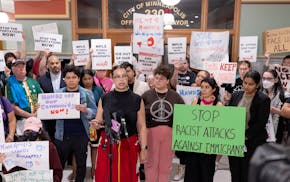Minneapolis leaders are weighing whether to sign off on a new police contract that grants its officers historic wage increases, bumping starting salaries past that of some of the nation's largest law enforcement agencies, in a desperate effort to rebuild its dwindling ranks.
The proposed contract would guarantee a nearly 22% pay raise for veteran officers by next summer and boost starting salaries for rookies fresh out of the academy to more than $90,000 a year — surpassing the comparable wage schedules of New York, Chicago and Los Angeles.
Mayor Jacob Frey and Police Chief Brian O'Hara cast the raises as critical to attracting quality recruits, retaining experienced officers and restoring public trust amid court-mandated reforms seeking to overhaul the embattled department in the aftermath of George Floyd's murder.
Top city officials lauded the contract as one that would make Minneapolis police among the top three highest-paid departments in the state. Many speakers at a hearing Tuesday night said it was worth the cost.
"I propose that we are paying for our future police force, not our past police force," said Jane Lansing, a board member with the League of Women Voters Minneapolis. "We know that the contract is not perfect, but it is good. We encourage you to march forward with good and approve the contract."
But local activists are calling on City Council members to reject the deal, denouncing the collective bargaining agreement as an attempt to inflate wages without upholding longstanding promises of improving police accountability.
In a letter to elected officials, Communities United Against Police Brutality called it "unconscionable" to give double-digit raises to a department that has cost the city more than $71 million in police brutality settlements since 2019.
"That level of pay increase should be reserved for a police force that shows an appropriate level of service and accountability to the community," wrote Michelle Gross, president of the watchdog group.
Since June 1, 2020, Minneapolis has also paid more than $24 million in workers' compensation settlements to more than 150 Minneapolis police officers, according to a Star Tribune analysis. Many left the department after filing PTSD claims, contributing to a nagging staffing shortage that has shrunk the agency by 40% since May 2020 and ballooned overtime costs.
MPD currently has 516 sworn staff on active duty, compared to roughly 900 at its peak.
A showdown over the contract comes amid continued fallout from the recent line-of-duty death of Minneapolis police officer Jamal Mitchell and the city's projected $21.6 million budget hole, which may result in steep property tax hikes for residents.
Minneapolis' current police labor agreement was adopted in March 2022 after state mediation and expired Dec. 31 of that year.
The 166-page agreement requires sign-off by the full City Council. The body doesn't have the ability to propose changes to the labor agreement, only to approve or reject it. If they refuse to endorse it, the city's labor negotiating team must return to mediation alongside the police union.
What provisions does it include?
- Broadens the chief's managerial powers: Several provisions grant O'Hara more discretion in how and where he can move personnel, including temporarily reassigning supervisors to officer duties; requiring all officers to work at least one critical staffing overtime shift — where they receive double their hourly pay — every 28 days. Another extends the time period in which an officer accused of misconduct can be placed on leave while being investigated, from 30 days to 180 days.
- Expands the number of civilian investigator positions in the department.
- Raises field training officer (FTO) pay from $2,500 to $3,000 per year.
- Codifies coaching: Language cements the city's longstanding position that coaching, a form of one-on-one mentoring to correct low-level policy violations, does not constitute as discipline and therefore isn't public. (Despite years of denial, police have at times used this corrective measure to address instances of serious officer misconduct, a Star Tribune story last month revealed.)
- Rolls back language requiring that an officer be automatically told the identity of anyone requesting their public personnel records (a provision criticized in the previous contract for its potential to infringe access to public data). Officers will still be notified when someone pulls their file.
How to pay for it
The contract will cost an estimated $9.2 million in future spending above what had previously been planned for, as well as an estimated $5.5 million in back pay, which can be covered in the city's current budget.
Frey said he intends to spread the additional $9.2 million over three years — from 2025 through 2027 — in hopes of reducing the immediate property tax impact. He wants to fund those incentives through state public safety aid approved by the Legislature for Minneapolis last year, although much of that money has already been appropriated by the council to programs that focus on nontraditional policing, crime prevention and racial justice-informed public safety.
Members of the council's progressive wing lambasted that plan this week, saying that it amounted to "defunding" community-based alternatives.
Community comments
Dozens of residents packed the council chambers in downtown Minneapolis on Tuesday night, exceeding capacity even in an adjacent overflow room.
Margaret Anderson Kelliher, the city operations officer, walked council members through the new contract, emphasizing changes that give the city broader disciplinary and staffing authority. Several council members critical of police noted that they were pleased to see many of their priorities included in the tentative agreement — such as the removal of the so-called 70/30 clause, which sets minimum staffing levels for certain positions — but they said they were concerned that many of them will expire in a few years if they're not renewed.
In a rebuttal presentation, a grassroots police reform group pushed back on the notion that expanding the chief's managerial oversight constituted as robust reforms and argued that the city was leaving a "viable tool" for enhanced accountability on the table.
"We're tired of playing games," said Stacey Gurian-Sherman, of MPLS for a Better Police Contract. "We got 22% increases, but we do not have proportional benefits. The fact that it's so uneven shocks the conscience."
Susan Field, who came with a group of orange-shirted Minneapolis neighborhood safety clubs, scolded any council members considering voting against the contract. "Abort the activist chaos," she said. "We just want safe streets. … Put down your hammers, and listen and lead. The criminals aren't going anywhere anytime soon."
The public will have a second chance to speak on the police contract on July 8 — assuming the council doesn't vote the contract up or down Thursday.

Minneapolis City Council lowers street food cart license fee, hoping fruit sellers will hawk legally

How the federal raid unified the fractious Minneapolis City Council against Trump, sort of
Trump travel ban 'cruel,' Minnesota advocacy group says

No verdict after first day of jury deliberation in Derrick Thompson murder trial for crash that killed 5




